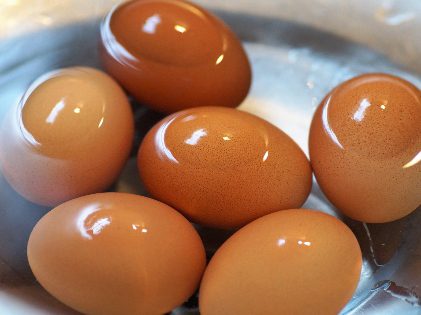 Eggs are healthy, and it’s a proven fact. However, the nutritional profile of eggs depends a lot on the way you cook them. There are many ways you can prepare eggs, and one of the smartest and the healthiest ways is to hard-boil them. Not only will you get the nutrition you are looking for, but they are also tasty as hell.
Eggs are healthy, and it’s a proven fact. However, the nutritional profile of eggs depends a lot on the way you cook them. There are many ways you can prepare eggs, and one of the smartest and the healthiest ways is to hard-boil them. Not only will you get the nutrition you are looking for, but they are also tasty as hell.
Just fill a quarter of the saucepan with cold water, place the eggs in it, and add water until it covers the eggs by an inch or two. Heat the saucepan till the water begins to boil. Then turn off the heat and keep the pan covered for 10 to 12 minutes. Strain the water from the saucepan and cool the eggs by pouring cold water on them. Peel the eggs when they are under running water and relish. Now, have a look at the nutritional profile of hard-boiled eggs.
Fat
You get 5 grams of fat from one hard-boiled egg, out of which less than 2 grams are of saturated fat. When you have only hard-boiled eggs, fat becomes an essential component. The amount of fat in eggs helps your body absorb the fat-soluble vitamins that you get from eggs.
Protein
From one hard-boiled egg, you get 6 grams of protein. Therefore, you can easily have them after a workout or at the office when you have a packed schedule. If you have a busy lifestyle and have the habit of skipping your lunch, hard-boiled eggs are a good substitute that will take care of your daily nutrition intake. Though an egg offers 80 calories, you need not worry. Eggs keep you full. The protein content helps you in weight loss.
Cholesterol
Cholesterol in eggs, especially egg yolks, has terrified people over the years and kept them away from a solid nutritional profile. The common perception is that cholesterol is bad for the heart. Naturally, people have sort of demonized egg yolks. But the fact of the matter is, you get 186 mg of cholesterol from one large egg. That’s a bit more than half of the daily recommended value. According to current research, dietary cholesterol might not have a huge impact on blood cholesterol.
Vitamin D
 The intake of Vitamin D is essential in winter. You get 10% of your daily recommended value of Vitamin D from one egg. Vitamin D also helps absorb calcium, thus having a significant impact on the health of your teeth and bones. Vitamin D also cuts down the risk of cancer, type II diabetes, and other chronic diseases.
The intake of Vitamin D is essential in winter. You get 10% of your daily recommended value of Vitamin D from one egg. Vitamin D also helps absorb calcium, thus having a significant impact on the health of your teeth and bones. Vitamin D also cuts down the risk of cancer, type II diabetes, and other chronic diseases.
B Vitamins
B Vitamins play an important role in improving your metabolism. Eggs are an excellent source of B Vitamins. Your body needs B-12for red blood cell formation and the proper functioning of the central nervous system. Non-vegetarians can get it from meat.
But vegetarians have to look for other sources. Choline, an important nutrient, helps in regulating brain and cell function. Besides that, it is also rich in B Vitamins. While men should consume 550 mg of choline in a day, the recommended value for women is 425 mg. You get 100 mg choline from a hard-boiled egg.
White Hard-Boiled Eggs vs. Brown Hard-Boiled Eggs

A huge debate on whether brown eggs are better than white eggs has been going on for quite some time. There is a popular perception that brown eggs are of better quality and more nutritional than their white counterparts. The price of higher eggs is on the higher side, and that might be why there are healthier than brown eggs. Besides that, they are also larger than white eggs. The hens have to be fed more.
Overall, as per various studies conducted to figure which one is more nutritious, brown eggs and white eggs are more or less of the same quality. The nutrient density is also somewhat the same. If you want to buy eggs of the highest quality, choose the organic and the free-range ones. They are a better choice than all-natural and cage-free. Also, you can buy the local ones.
With an impressive nutrition profile, hard-boiled eggs are a great choice. Hard-boiled ones have optimum amounts of fat, protein, calories, vitamin D, and B vitamins, and you can snack on them without worrying about weight gain.
